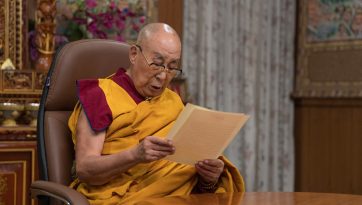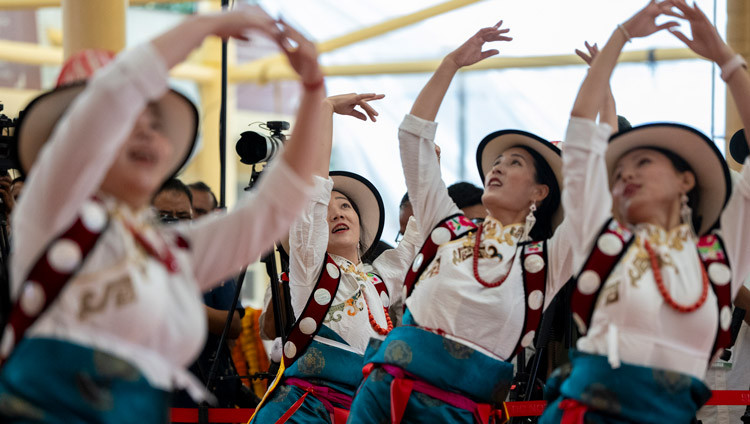His Holiness the Dalai Lama Addresses Students and Teachers of Jesus & Mary College
February 8th 2017, Dalailama.com
New Delhi, India, 7 February 2017 – There was a cool breeze, despite the bright skies, when His Holiness the Dalai Lama arrived at Jesus & Mary College, a leading women’s educational institution, this morning. The Principal, Sr Rosily received him warmly as he stepped out of his car. Five young Tibetan women, students of the College, presented the traditional ‘chemar changpu’ at the door to the auditorium.
 |
| A group of students singing a song to welcome His Holiness the Dalai Lama at the start of his talk at Jesus & Mary College in New Delhi, India on February 7, 2017. Photo/Tenzin Choejor/OHHDL |
“Respected elder sister, as well as younger sisters and brothers,” His Holiness began, “all 7 billion human beings on this planet today are physically, mentally and emotionally the same. We all wish to live a happy life and we all have the same right to do so. However we seek to fulfil this wish, it is important to have a sense of the oneness of humanity. We are all members of one human family. Christians say we are all children of one God, Buddhists say all sentient beings share a desire for happiness.
“Right now, while we are enjoying each other’s company in peace and tranquillity, in other parts of the world people are killing each other in anger and hatred driven by a sense of ‘us’ and ‘them’. This makes it all the more urgent that we fulfil our common responsibility to make the 21st century different from the 20th century, in the course of which historians estimate 200 million died violent deaths. I believe such statistics have an impact on our minds, impelling us to find ways to avoid the use of force.
“I take hope and inspiration from the spirit of the European Union. After the end of the Second World War, countries of Europe that had been embroiled for centuries in violent conflict, decided to put peace in the wider community ahead of local national interest. I have great admiration for this spirit. We’ve seen something similar in India that used to be a collection of quarrelling kingdoms, which now participate in the greater Republic. People in the South may argue that their language is richer than Hindi, Punjabis may argue that they work harder, but all are proud to be Indian. I look forward to a time when something like the spirit of the European Union is active in Africa, Latin America and even here in Asia.
 |
| His Holiness the Dalai Lama speaking to students and teachers and Jesus & Mary College in New Delhi,India on February 7, 2017. Photo/Tenzin Choejor/OHHDL |
“Scientists tell us basic human nature is compassionate. The people of the world should unite to work together, just as children readily play together without concern for secondary differences between them. When we go to hospital the primary concern is the need for help and treatment, not where we come from or what we believe. This is the kind of spirit we need to nurture. How can we advance the sense of our common humanity?—through education. We must share responsibility for meeting the problems like climate change, depletion of natural resources and expanding population that affect us all. To limit our concern to our own nation alone is out of date. Technology has already contributed to creating a global community.
“You tell me that this college is 50 years old. Think how many people have already trained here and how many more will emerge as helpful and qualified people in future. Education is how people improve and I am committed to promoting a sense of oneness among all human beings.”
His Holiness also spoke of his commitment to fostering inter-religious harmony. He declared that he has many good friends who are Muslim, Hindu, Christian, Jewish, Sikh, Parsee and Jain, as well as Buddhist. He said he is convinced that each of these faiths has the potential to help people be good human beings. This is part of their common purpose, the encouragement of love and compassion, which their different philosophical approaches serve to support.
“Since all these religious traditions have long lived side by side in India in mutual respect, I often cite this country as a living example that religious harmony can be achieved. Since there is little friction here between Sunni and Shia traditions, I’ve also suggested that Indian Muslims could mediate among Muslims who are in conflict elsewhere.”
His Holiness explained that as a Tibetan his third commitment is to keeping Tibetan language and knowledge alive. He made clear that he fully retired from further political responsibility in 2011, but remains committed to preserving Tibetan culture and protecting the delicate natural environment of Tibet. He added that he is encouraged by the number of young Indians taking an interest in understanding the workings of mind and emotions, as spelled out in books derived from ancient India, but available in Tibetan, from a practical and academic point of view. He is convinced that such knowledge and the contribution it can make to emotional hygiene is relevant and useful today.
 |
| A student taking notes as His Holiness the Dalai Lama answers her question during his talk at Jesus & Mary College in New Delhi, India on February 7, 2017. Photo/Tenzin Choejor/OHHDL |
Answering a student’s question about nationalism and demilitarization, His Holiness repeated his belief that today cultivating global responsibility is much more important. He said it involves using our intelligence to the full and looking at things from a wider perspective. He observed that demilitarization would release money and resources for more constructive development.
He told another questioner that the purpose of life is to be happy and that the crucial point is not what work you choose to do, but that you should do it with a positive and altruistic motivation.
Regarding terrorism, His Holiness suggested that it is wrong to use such terms as ‘Muslim terrorist’ or ‘Buddhist terrorist’ because the actions of terrorists have nothing to do with the teachings of either Islam or Buddhism. Terrorism arises out of anger and hatred, negative emotions that run out of control. Ultimately, he suggested, the use of force is less effective than letting emotions cool and reaching out to enter into dialogue. This might involve the intervention of unbiased but trusted and reputed international figures like his friend the late President Havel.
Finally, His Holiness was asked if what is portrayed in the film ‘Seven Years in Tibet’ is true. He replied that his elder brother had initially made friends with Heinrich Harrer and Peter Aufschnaiter. Harrer had been his first source of information about Europe. The book he wrote about his experiences was largely accurate, and the film was based on that, although some aspects may have been elaborated for dramatic effect. His Holiness was clear that Harrer had remained a staunch friend of Tibet until the end of his life.
Prior to the vote of thanks, His Holiness addressed the audience once more.
“According to Christianity, we are all children of God, so we should all be concerned for each other,” he said. “The Buddha stated, ‘You are your own master, what happens to you depends on what you do.’ To learn to tackle our emotions is something that involves the mind and the use of intelligence on the basis that our minds are calm. That’s all.”
A senior member of college staff expressed the College’s gratitude to His Holiness for coming and thanked all the teachers, students and staff who had contributed to making his visit an enormous success. Outside, His Holiness planted a tree to commemorate the occasion.




